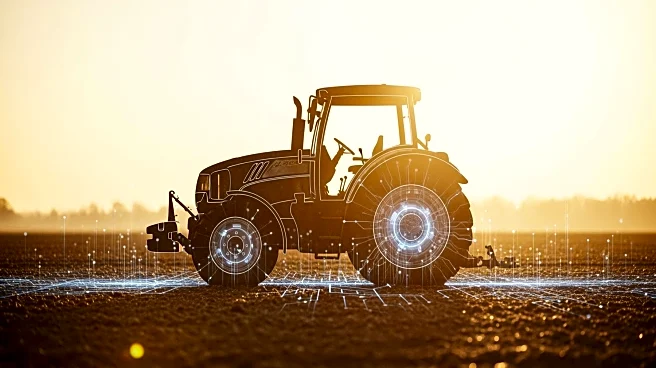What's Happening?
International Tractors Limited (ITL), a leading Indian tractor export brand, showcased its latest agricultural machinery innovations at Agritechnica 2025 in Hannover, Germany. The exhibition featured the launch of the Solis S40 Shuttle XL and the Solis EXTRA
series, both equipped with Stage V emission technology. The Solis S40 Shuttle XL, positioned in the 40 HP category, includes a 3-cylinder Stage V Yanmar engine, 8F+8R Synchromesh Transmission, and a 1000 kg hydraulic lift capacity. The Solis EXTRA series offers compact tractor solutions in the up to 26 HP segment, featuring Auto Throttle functionality and modern connectivity options. ITL's display also included various other models and electric mowers, all manufactured at its Hoshiarpur facility.
Why It's Important?
The unveiling of ITL's advanced tractor range signifies a significant step in the global agricultural machinery market, particularly in meeting the stringent European emission standards. By incorporating Stage V emission technology, ITL is positioning itself as a leader in sustainable farming solutions. This development is crucial for the European market, which demands high-performance and environmentally friendly agricultural equipment. The introduction of these tractors could enhance productivity and comfort for farmers, potentially leading to increased adoption across Europe and other regions.
What's Next?
ITL aims to establish new benchmarks in productivity, comfort, and sustainability for global agriculture. The company is focusing on delivering technology tailored to the demanding European market requirements. As ITL continues to innovate, it may expand its market presence further, potentially influencing other manufacturers to adopt similar technologies. The tractors' compliance with Stage V emission standards could also set a precedent for future agricultural machinery developments.
Beyond the Headlines
The introduction of advanced tractors by ITL highlights the growing importance of sustainable practices in agriculture. As emission standards become more stringent globally, manufacturers are compelled to innovate and adapt. This shift towards environmentally friendly solutions could lead to long-term changes in farming practices, promoting sustainability and reducing the carbon footprint of agricultural operations.















